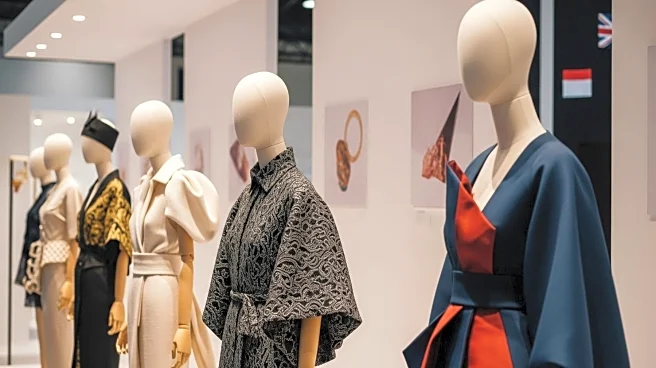What's Happening?
During Paris Fashion Week, several trade shows including Première Classe, Tranoï, and Man/Woman showcased a diverse array of fashion and accessories. These events highlighted the ongoing challenges faced by independent fashion brands due to geopolitical uncertainties and trade tariffs. Despite these challenges, exhibitors and visitors expressed optimism about the American market's interest in independent brands. The shows attracted 12,000 visitors, up from 9,500 the previous year, with around 300 labels participating, a third of which were newcomers. The events also featured new categories such as home goods, wellness, and beauty, reflecting a shift in consumer preferences towards experiential shopping.
Why It's Important?
The trade shows in Paris underscore the evolving landscape of the fashion industry, where independent brands are navigating complex global challenges. The increased visitor numbers and participation of new labels indicate a growing interest in unique and under-the-radar brands. This trend could benefit U.S. retailers looking to diversify their offerings and attract consumers seeking authenticity and craftsmanship. The focus on experiential shopping and new categories suggests a shift in consumer behavior, potentially influencing retail strategies in the U.S. market.
What's Next?
As geopolitical uncertainties and trade tariffs continue to impact the fashion industry, independent brands may need to explore alternative strategies to sustain growth. The partnership between WSN and U.S.-based Shoppe Object for a European edition of the homewares show in January indicates a move towards diversification. Retailers and brands may increasingly focus on creating unique shopping experiences to attract consumers. The success of these trade shows could encourage more U.S. retailers to invest in emerging brands, fostering innovation and competition in the market.
Beyond the Headlines
The emphasis on sustainability and social enterprise, as seen in brands like Hawa, reflects a broader cultural shift towards ethical fashion. This trend could influence consumer expectations and drive demand for brands that prioritize social responsibility. The participation of international designers and brands highlights the global nature of the fashion industry, potentially leading to increased cross-cultural collaborations and exchanges.








